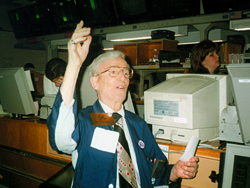Michael Pascuma, likely the oldest living stock trader in the U.S., turned 100 years old earlier this week.
His 80-year career began before the Crash of 1929 and when traders still called the American Stock Exchange “the Curb.” What’s more remarkable, he left the floor a mere two years ago–at age 98.

“He just turned 100, so think about what’s happened in the past 100 years,” said Pascuma’s grandson, also named Michael Pascuma, and also a trader. “He’s literally been through a chunk of civilization. It’s unbelievable what he’s seen in his time.”
Pascuma earned plenty of press during his career. The recognition focused on the triumph of his longevity on the floor. But he also experienced his share of tragedy in the last decade.
To be sure, Pascuma had front-row seats to many of Wall Street’s most dramatic moments, including the ’29 Crash, the post-war boom, the go-go ’60s, the ’87 crash, the dot-com bull market and subsequent collapse, as well as the real estate boom and ensuing mortgage-backed securities meltdown.
Pascuma also lived through harrowing moments in American history while on the Amex floor. The Depression raged during his 20s and early 30s. World War II followed.
At age 35, he served with the U.S. Army, and even landed on Utah Beach, in Normandy, on D-Day. Serving in the war marked his longest stint away from the Amex floor.
He also lived through the tragedy of having his son, Michael Pascuma Jr.–also an Amex floor trader–die on 9/11. Pascuma was asked to ring the Amex bell when the exchange reopened after being closed from the attacks.
Michael Pascuma was not available to speak to Traders Magazine.
His Wall Street career started in 1925, at age 16, as a runner for a brokerage firm. He collected and delivered order slips to and from the American and New York Stock Exchanges.
Soon he started taking stock quotes over the phone. By 1937, he was a member of the Amex.
Over the years, he saw many changes to his trade. The advent of computers on the trading floor and the transition from trading stocks in pennies rather than sixteenths–and before that eighths–were some of the more dramatic changes he talked about most, grandson Michael Pascuma said. He did manage to leave the business before the NYSE bought the Amex early last year and closed the floor at Trinity Place.
Though his environment changed around him, Pascuma maintained some constants. He rode the subway to and from work every day. He kept using his buy and sell pad until his last trade, long after everyone else on the floor switched over to computerized handhelds, his grandson said.
He also had his quirks. Pascuma ate an enormous apple turnover he bought from the same store every day, according to James R. Hyde, a vice president with NYSE Amex Options, of NYSE Euronext.
Hyde was an options trader on the Amex for almost 20 years, and was the last Amex vice chairman. And though he worked in options, while Pascuma traded equities, the two knew each other, Hyde said.
Pascuma understood the rules of the floor very well, and he was quick to remind people of them, Hyde said.
“He was a stickler for details,” Hyde said. “And he would, in fact, remind you of the dress code, about high-top sneakers you perhaps wore. One of his pet peeves was if you were sitting down in a chair, he would remind you that there are no chairs allowed down on the floor. Over time, there probably were several hundred chairs on the floor. But at that time, and in his day, you stood up and you liked it.”
Today, Pascuma lives in the same neighborhood where he grew up, Richmond Hill, Queens, his grandson said. And while he left his life on the Amex floor, the floor life had never left him.
“He loved the business, loved his job,” grandson Michael Pascuma said. “The joy was to get up and go to work. He was somebody who was always working.”
The other joy was thoroughbred racing: He loved horses and the track. Horseracing was in the family blood. His younger brother, Warren, was a jockey and horse trainer.
Michael Pascuma was one of the first in his family to stray from the business when he started working on Wall Street, his grandson said. Still, Pascuma has bred and raced horses throughout his life.
“He would go to work five days a week,” his grandson said, “and he would go to the race track Saturday and Sunday to race his horses.”
Trading and horse racing were two constants in his life–and family. Not only did his son and grandson go into trading, but he also found solace in the “Sport of Kings,” after a tough week of trading.
It just may have been the electricity of the crowd and the thrill of the sport, whether trading or at the track, that kept him going all those years.
“He loved horses and the excitement,” his grandson said. “He didn’t do it for the gambling or money. He did it because he loved the sport and horses. It was his other passion in life next to Wall Street.”



